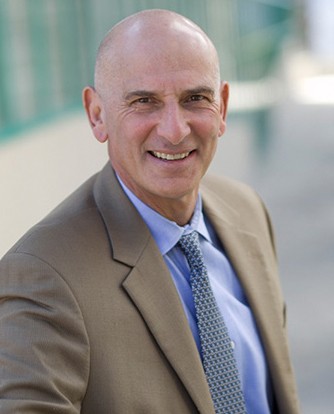PMA professor’s dual role as doctor continues during pandemic
Whether he’s working as a professor in the Department of Performing and Media Arts or as an emergency physician at Cayuga Medical Center’s Urgent Care, Dr. David Feldshuh often draws on the same skills.
“The content of directing plays and emergency medicine is very different,” said Feldshuh, who has been practicing medicine for 38 years. “But the two professions are similar in requiring a tolerance for ambiguity, and the ability to make decisions and take action steps often based on incomplete data.”
In both professions, he said, “the story is in process.”
Feldshuh – author of the play “Miss Evers’ Boys,” based on the Tuskegee syphilis experiment, which was a finalist for the 1992 Pulitzer Prize for drama – was already finding success as a theater director and had earned a doctorate focused on creativity and actor training when he decided to go to medical school at the University of Minnesota in 1979.
He put himself through medical school directing plays, and completed a residency and board certification in emergency medicine. He came to Cornell in 1984 and continued practicing emergency medicine before moving to Urgent Care.
Feldshuh said he’s grateful to be practicing medicine in this time of need.
“I’m profoundly impressed by my health care colleagues in Ithaca, in Tompkins County and in the region – many of whom have taken a remarkable journey to New York City to help fight the pandemic there,” Feldshuh said. “And I’m in awe of all the caregivers in New York City and large cities across the country and around the world. I know what’s it’s like to work emergency medicine in a big city ER. It’s always challenging and unpredictable. This situation is far beyond challenging. It’s a battle that can feel like a nightmare.
“Like others, I’m anxious working in medicine,” he said. “But the ER and critical care health care workers – including doctors, nurses, paramedics and EMTs, people who are close to the intubation process – are the caregivers who are significantly at risk. Those are the people we all, to the highest level of power in this country, must support without hesitation and with every resource we can find or make.”
Feldshuh has volunteered in answer to New York state’s call for additional health care workers during the coronavirus crisis, and will expand his medicine commitment locally if the pandemic worsens in Ithaca.
“Cayuga Medical Center is working 24/7 to anticipate any possible surge in COVID infections that might come here,” he said. “In Tompkins the disease is under control at the moment, and hopefully it will stay that way.”
In the meantime, he’s continuing to don his scrubs and work additional shifts in Urgent Care, where, to avoid contagion, he now often communicates with patients via telemedicine rather than face to face.
“That’s a huge change in how I was taught to talk with patients,” he said.
The shift to telemedicine, he said, parallels Cornell’s adaption to Zoom for online classes.
Working in two fields, Feldshuh said, helps him appreciate and stay focused on both. For example, the shifts he’ll be working next week at Urgent Care will clear his mind for Laughter, the class he co-teaches with Sara Warner, associate professor in PMA.
“When you’re seeing patients for eight hours, you’re in a totally different world,” he said. “Each profession has its rewards and challenges. Doing both medicine and theatre helps me stay fresh – and even refreshed.”
His dual roles also inform each other, Feldshuh said.
“The ability to empathize with a character – to try to see clearly what an actor is showing an audience – is similar to looking at a patient and becoming aware of messages that might be less apparent: the way a patient breathes or stands or meets your gaze. Theater focuses you on these hidden messages.
“And medicine reinforces my appreciation that experience is central to any learning process. In the theater courses I teach, students have to ‘do it.’ Theater and medicine are the same in that way. They both demand the ability to keep ‘doing it’ if you’re going to learn, accepting failure as well as celebrating success.”


